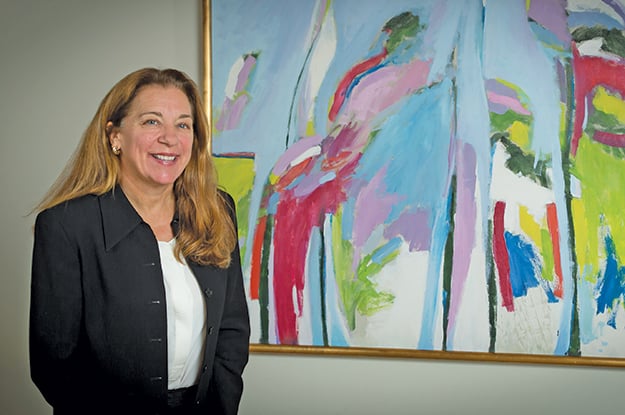Local Lawyer Helps Artists
Patti Jenkins on protecting art

It may have all started after her second year at UNC law school. During a summer internship in Charlotte, PATTI JENKINS did extensive research on protecting the moral law for visual arts and drafting arts law legislation.
“It was really fascinating, and I think that’s maybe why I gravitated to working with the arts,” says Jenkins, an attorney with Hogue Hill in Wilmington.
Some thirty years after that internship, Jenkins works to protect the intellectual property of local artists and writers through her pro bono work with Volunteer Lawyers for the Arts.
“Although North Carolina does not have a Volunteer Lawyers for the Arts organization, I have always committed a part of my practice to working with the arts, visual artists, and writers,” Jenkins says.
She started her law career in New York City at a large corporate firm, which did an extensive amount of pro bono work with artists. As a result, she received training through the New York Volunteer Lawyers for the Arts.
Now, she provides legal representation and education to artists and writers, as well as nonprofit arts and cultural organizations. She often gives talks to local groups to help inform artists of their rights and protections under the law.
Since moving to Wilmington in 1993, the Chester, Pennsylvania, native has helped dozens of artists, “in different capacities.”
Most of the work she does is helping artists with “practical things,” such as, “understanding what a copyright is and how you can get one; what you should do and what you need to do; and what it protects you against – who can use your stuff and under what parameters and exceptions,” according to Jenkins.
Protecting the work and the rights of the artists is the primary focus of Jenkins’ work.
She spends time explaining why protecting one’s work is essential while helping to guide artists and writers through the process. She also clarifies why it is important to take the necessary steps to do so.
“It is a matter of providing them with a basic level of what’s OK and what’s not OK,” Jenkins says. “It’s the question of ‘Should you register your work?’ You don’t have to copyright, but there are some reasons why you should do it.”
Jenkins keeps up to date on the latest issues in arts law to best serve her artists and writers by following arts blogs out of New York, and one such issue that keeps arising has to do with Appropriation Art.
“This really pushes the envelope when someone appropriates someone else’s work in their own,” Jenkins says.
She references the case of artist Richard Prince who she calls the “king of this.” Prince has built a career by incorporating other people’s work and accumulating copyright lawsuits as a result.
At Hogue Hill, Jenkins practices estate planning, as well as corporate and intellectual property law, but those areas can sometimes overlap with her pro bono work with the arts.
“With my estate work, someone may inherit artwork, but that does not give them the right to make prints of that work. Only the person who inherited the estate has the ability to decide if prints can be made,” Jenkins says.
Jenkins enjoys helping clients navigate the murky legal waters.
Wilmington’s thriving arts community is a hub of artistic activity that Jenkins says she is in awe of since she has no artistic ability herself, although she married into a family of artists.
“It is wonderful. Everything is great. The Fourth Fridays, the arts council, the Cameron (Art Museum, which Jenkins has served on the board of), are all doing cool stuff,” she says.
Jenkins says she applauds the Cameron Art Museum’s Connections Program that provides supportive opportunities for those with mental, physical, emotional, or behavioral disabilities to experience the museum on Mondays when it is closed to the general public.
“It is a really nurtured environment,” she adds.
To view more of photographer Mark Steelman's work, go to www.marksteelmanphoto.com.